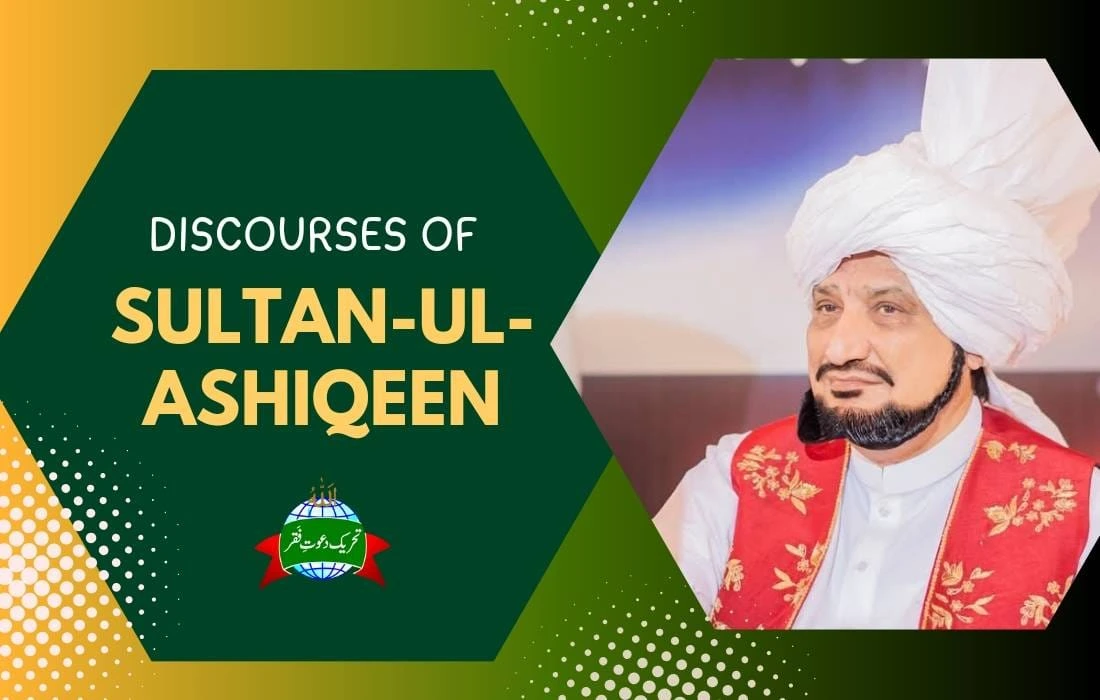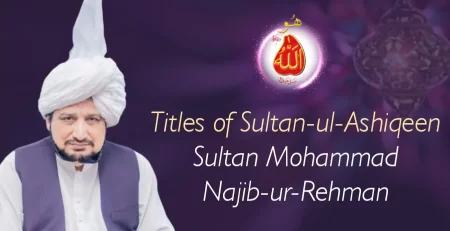Ism-e-Mohammad is not just a Divine name
Friday, 2nd April 2010
Sultan-ul-Ashiqeen revealed, “My spiritual guide passed away on 26th December 2003. During his lifetime, he did not bestow Ism-e-Mohammad to anyone besides me. This treasure (of Ism-e-Mohammad) was kept a secret therefore, none of the prior nations attained complete immortality (baqa). It is a distinctive attribute of the umma of the Prophet Mohammad (pbuh) or simply put, it is granted by the blessing of the Holy Prophet. A spiritual guide is the one who is well-versed with Ism-e-Mohammad.
A disciple asked, “What is the difference between Ism-e-Allah Zaat and Ism-e-Mohammad?”
There is no difference between Ism-e-Allah Zaat and Ism-e-Mohammad. Sultan Bahoo says in Mehak-ul-Faqr Kalan, “Ism-e-Allah Zaat transforms into Ism-e-Mohammad.” Allah said in the Holy Quran:
اِنَّ الَّذِیْنَ یُبَایِعُوْنَکَ اِنَّمَا یُبَایِعُوْنَ اللّٰہَ یَدُ اللّٰہِ فَوْقَ اَیْدِیْہِمْ
(سورۃ الفتح ۔10)
Meaning: (O Beloved!) Indeed, those who pledge allegiance to you in fact pledge allegiance to Allah alone. Allah’s hand is over their hands.
(Quran 48:10)
Ism-e-Allah Zaat is both Divine beauty (compassion) and majesty (wrath) whereas Ism-e-Mohammad is all Divine beauty.
It is not just a name, when the name is called the Essence is called. When you are contemplating the name then think of it as the Essence. Ism-e-Mohammad is the essence of the Holy Prophet when you contemplate it, think that you are looking at him, only then secrets reveal. Allah has innumerable attributes and each has a name. Mostly, ninety-nine names are talked of but in reality his attributive names are infinite but ‘Allah’ is his personal name. Likewise, the Holy Prophet’s name is ‘Mohammad’ and it is amalgamation of all his attributes. Sultan Bahoo quotes, “Ism-e-Allah Zaat is the greatest name of Allah and Ism-e-Mohammad is the straight path.
(Mehak-ul-Faqr Kalan)
The Holy Prophet is the guide in both the worlds and will be on the Judgment Day. Allah created the Holy Prophet for Divine guidance
یٰٓاَیُّہَا النَّبِیُّ اِنَّآ اَرْسَلْنٰکَ شَاہِدًا وَّ مُبَشِّرًا وَّ نَذِیْرًا وَّ دَاعِیًا اِلَی اللّٰہِ بِاِذْنِہٖ وَ سِرَاجًا مُّنِیْرًا
(سورۃ الاحزاب 45-46)
Meaning: O (Esteemed) Prophet! Surely, We have sent you as a witness, a bearer of glad tidings and a Warner, And (as) an inviter towards Allah by His command and as a sun spreading Light.
(Quran 33: 45-46)
One gets guidance and the straight path only from the Holy Prophet. Satan cannot take his form, even the people at the station of sharia understand it as is the Hadith, “Whoever saw me in dream then in fact he beheld me for, Satan cannot take my form.”
(Bukhari 6994, 6997; Ibn Majah 3903)
Nothing in this universe can take the Holy Prophet’s form. In Faqr, whoever sees (the countenance of) Ism-e-Mohammad has indeed seen the Prophet. Even while contemplating Ism-e-Mohammad, Satan cannot draw closer to man because it is not only a name but the essence of the Prophet. Satan is afraid of Ism-e-Allah Zaat and Ism-e-Mohammad, just like a polytheist is afraid of shahada. Even while contemplating it, a person feels peace descending upon him as it is purely Divine beauty and compassion. While contemplating, Ism-e-Allah Zaat is imprinted on the inward and Ism-e-Mohammad on brain. A person should perpetually invoke ‘Ya-Hoo’ and imprint Ism-e-Allah Zaat on the inward and Ism-e-Mohammad on the brain.
The sacred Companions looked at the countenance of the Holy Prophet being engrossed to the extent that they remained still such that the birds would sit on their heads and birds usually sit on a static object. For them, the Holy Prophet was both Ism-e-Mohammad and Ism al-Azam (the greatest name of Allah), hence they would achieve their objectives while beholding him. The Companions traversed this path while beholding the Prophet. After he passed away, this path is pursued by contemplating Ism-e-Mohammad. It grants access to the Mohammadan Assembly where he himself bestows the seeker with Divine gnosis. It is here where a seeker transpires and is stationed at belovedness.
Difference between Sarwari Qadri order and other orders
Someone inquired the majestic spiritual guide, Sultan-ul-Ashiqeen, “What is the difference between Sarwari Qadri order and other orders?”
Sultan-ul-Ashiqeen answered after opening his gentle eyes from deep reflection:
- In other Sufi orders, a disciple is granted Ism al-Azam after multifarious endeavours and mystic exertions while in Sarwari Qadri order, the first thing granted is Ism al-Azam so that this path is traversed promptly.
Truth of Certainty
A disciple inquired, “When does a disciple attain perfection in certainty?”
Sultan-ul-Ashiqeen politely responded:
- First a disciple annihilates in the spiritual guide then in the Holy Prophet and finally in Allah. Perfection in certainty is achieved when the same countenance is witnessed during annihilation in the spiritual guide, the Holy Prophet and Allah.
During the contemplation of Ism-e-Mohammad or Ism al-Azam, Allah transfuses the evidence in the inward and bestows Divine observation. It is this Divine observation that grants perfection in certainty i.e. truth of certainty.
The Countenance of the Spiritual Guide
Someone asked: “Is the countenance of a Perfect Spiritual Guide Ism-e-Mohammad?”
Sultan-ul-Ashiqeen humbly quoted:
- This is a matter of spiritual observation. As Sultan Bahoo revealed, “First, I was four, then I became three and afterwards two, when I came out of duality, I became one with Allah.” Sultan Bahoo says that real faith is certainty.”
Eternal Life of the Holy Prophet
A disciple daringly questioned, “What the word ‘Say (Qul قل)’ imply (in Quranic verses)?”
Sultan-ul-Ashiqeen said:
- Whenever a verse begins with the word ‘say’, it implies the physical being of the Holy Prophet. As this is still present in the Quran while the Holy Prophet has passed away, it points to the (eternal) life of the Holy Prophet.
Why Men Do Not Understand the Meaning of the Quranic Verses
The exquisite conversation proceeded with Sultan-ul-Ashiqeen citing:
- The verses of the Holy Quran are the Divine light (Nur) and those indulged in ignorance cannot comprehend them. Allah says:
اَللّٰہُ وَلِیُّ الَّذِیْنَ اٰمَنُوْا لا یُخْرِجُھُمْ مِّنِ الظُّلُمٰتِ اِلَی النُّوْرِ
(سورۃالبقرہ۔ 257)
Meaning: Allah is the Guardian of the believers. He brings them out of darkness and takes them towards the light.
(Quran 2: 257)
The Holy Quran is understood when a man is surrounded by the Divine light and Ism-e-Allah Zaat is the light.
Divine vision
Sultan-ul-Ashiqeen said, “Allah Himself grants the ability to His vision. Like Sultan Bahoo quotes, ‘Allah Himself is the Speech as well as the Speaker, He is the Writer as well as the Book, He Himself is the Proof and the Proved, He is the Lover and the Beloved’.”
Salman the Persian
Sunday, 4th April 2010
A person inquired the difference between Salmani and Suleimani in the following verse of Iqbal?
یہ فقر مردِ مسلماں نے کھو دیا جب سے
رہی نہ دولتِ سلمانیؓ و سلیمانیؑ
Ye Faqr Mard-e-Musalman Ne Kho Diya Jab Se
Rahi Na Doulat-e-Salmani-o-Sulemani
Sultan-ul-Ashiqeen elaborated that by ‘Sulemani’, it refers to Prophet Solomon, who ruled the world and had authority over all the things and by ‘Salman’, it points towards Salman the Persian who went out in search of Allah. He and his ancestors were Zoroastrians but soon he felt disheartened from all of it and ran from home. He stayed with a Christian and after his death went to someone else. Similarly, when one died, he would name another priest. After visiting numerous priests, he finally met the last one, who told him that he couldn’t think of anyone else in the world, but revealed that the time of the last Prophet, a descendant of Prophet Abraham, was near. The priest advised him to migrate towards the Prophet between two mountains where date palms were abundant. Then, the priest shared three distinctive symbols of Prophet Mohammad.
1) Will not accept sadaqah for himself
2) Will accept gifts though
3) Between his shoulders is the stamp of Prophethood
Salman the Persian immediately set out for Madina, but unfortunately, he was sold by the caravan to a Jew, who took him to Madina. Eventually, the time arrived for the Holy Prophet’s migration to Madina. Upon hearing of this, Salman went to Quba to meet him, presenting some dates as sadaqah. The Prophet gave the dates to his Companions but did not eat them himself, thereby fulfilling one of the signs Salman had been told to expect.
The next day, Salman went to meet the Prophet again, presenting some dates as a gift. This time, the Prophet ate some of the dates himself and also invited his Companions to partake, thereby fulfilling another of the signs Salman had been expecting. The last sign was fulfilled by the Holy Prophet himself when he showed the stamp of Prophethood. He immediately accepted Islam.
Salman the Persian is the second Imam of the Naqshbandi order. The Prophet also called him one among the People of the Cloak (ahl al-bayt).
Renounce the World and the Hereafter
واعظ! کمالِ ترک سے ملتی ہے یاں مراد
دنیا جو چھوڑ دی ہے تو عقبیٰ بھی چھوڑ دے
Waaiz! Kamal-e-Tark Se Milti Hai Yaan Murad
Dunya Jo Chor Di Ha Tau Uqba Bhi Chor De
An ascetic worships for hereafter, the paradise. It is for heaven that he strives. Allama Iqbal is urging the ascetic to renounce all worldly attachments and even the desire for paradise, and to surrender solely to Allah. Only then, he suggests, can one attain complete trust in Allah. For this, a man must be willing to put at stake everything. Surprisingly, there is a deep sense of joy in it all. Therefore, Abu Bakr Siddiq was content and happy even after sacrificing everything in the way of Allah. Imam Ghazali quotes:-
- One who has tasted the sweetness of spiritual reality and Divine gnosis will remain devoted to it, even if the heavens were granted to him in this world.
(Kimiya-e-Saadat)
- One who has tasted the sweetness of spiritual reality and Divine gnosis will remain devoted to it, even if the heavens were granted to him in this world.
Responsibilities of Imam
Allah entrusts the responsibilities of spiritual leadership (Imam) to the one who has these three qualities, as aptly expressed by Allama Iqbal:
سبق پھر پڑھ صداقت کا، عدالت کا، شجاعت کا
لیا جائے گا تجھ سے کام دنیا کی امامت کا
Sabaq Phir Parh Sadaqat Ka, Adalat Ka, Shujaat Ka
Liya Jaye Ga Tujh Se Kaam Dunya Ki Imamat Ka
Explanation: The responsibility of (spiritual) leadership of the world will be yours, but once again, reflect on the essential lessons of truthfulness, justice and bravery.
Truthfulness should be reminiscent of Abu Bakr Siddiq, justice like Umar ibn Khattab and bravery like Ali ibn Abi Talib. When you reach perfection in all these three only then leadership will be bestowed upon you. A seeker is accomplished only when the spiritual sight of Abu Bakr Siddiq blesses with truthfulness, Umar ibn Khattab’s sight blesses with justice, Usman ibn Affan’s sight blesses with modesty and gateway of Faqr, Ali ibn Abi Talib, blesses with Faqr. Leadership is bestowed after all this is.
Miraj
Conversation took a surprising turn to Miraj when Sultan-ul-Ashiqeen eloquently said:
On Miraj, Prophet Mohammad ascended to the heavens with his physical body. Although the Prophet (was already elevated and) did not require this experience, the Miraj occurred to silence his detractors and demonstrate the truth of his Prophethood.
In Shawahid-un-Nabuwat, it is recorded that Miraj took place in the sixth year of the Holy Prophet Mohammad’s Prophethood. During this miraculous journey, he travelled with Angel Gabriel to Al-Aqsa Mosque in Jerusalem within a single night. When he shared this experience with the Quraish, they were incredulous and dismissed it as impossible. They questioned him about Al-Aqsa Mosque, he was able to provide detailed and accurate descriptions, satisfying their inquiries. Furthermore, when they asked about a caravan they had sent to Syria, the Prophet provided precise information about its whereabouts and expected return, “The caravan is still on its way. One of the travellers was shivering and asked his slave for a blanket. I was thirsty and drank water from a vessel they had. A person had lost one of his belongings, but it was found when we passed by. The camels were startled by the Buraq and scattered, causing the travellers to search for them. As a result, they will arrive on such-and-such day at sunrise.”
The Quraish were astonished by the Prophet’s detailed account and began eagerly awaiting the caravan’s arrival. They divided themselves into two groups: one to watch for the caravan on the horizon, and the other to monitor the sun’s position, anticipating the exact time of sunrise that the Prophet had predicted. Suddenly, the first group cried out, announcing the arrival of the caravan. Simultaneously, the second group exclaimed that the sun had risen. The Quraish rushed to welcome the caravan and began inquiring about the blanket, the water, the scattered camels and the lost item. To their astonishment, every traveller confirmed the events exactly as the Holy Prophet had described them. Yet, despite this miraculous validation, the Quraish remained stubborn and the spiritual locks on their inwards remained unopened.
Angel Gabriel and Miraj
On the night of Miraj, Angel Gabriel stated that he could not go beyond the Lote Tree on the farthest boundary as beyond that point lies the realm of Divinity (alam al-Lahoot). It is where Allah manifested the souls of human beings therefore only man can enter that realm. Had Angel Gabriel understood that it was the Holy Prophet Mohammad who was inviting him to accompany him beyond the Lote Tree, he would not have been harmed (by fire consuming his wings. Such is the power of the Prophet).
Divine Vision and Miraj
Sultan-ul-Ashiqeen said, “In the realm of Divinity, there is only Allah therefore the sustenance of human beings is the Divine vision like Ghawth al-Azam said, ‘Those who claim to worship Allah without beholding Him are pretenders.’ Ali ibn Abi Talib also said, ‘I do not prostrate until I see the Lord.’ Umar ibn Khattab expounded, ‘I saw Lord with His light in my inward.’ Ghawth al-Azam writes in Sir-ul-Asrar, ‘How can one claim to worship Allah without beholding.’ There are three levels of Allah’s recognition:
- Mystic: He is the one who beholds the Lord;
- Mystic annihilated in Allah: He is annihilated in Allah, is beyond humanness and his worships are superior;
- Mystic immortal with Allah: He is the one who is annihilated and immortal with Him. He returns to humanness and everything about him is worship’.”
Divine Vision and Meeting
Sultan ul Ashiqeen was posed a question that what is meant by the Arabic word Liqa?
He answered:
- Allah has used this word for Divine vision and there are separate words for meeting in Arabic. Therefore, both meeting and Divine vision are different. Liqa does not mean meeting as it will occur on doomsday. It means to behold the Divine countenance.
اِنَّ الَّذِیۡنَ لَا یَرۡجُوۡنَ لِقَآءَنَا وَ رَضُوۡا بِالۡحَیٰوۃِ الدُّنۡیَا وَ اطۡمَاَنُّوۡا بِہَا وَ الَّذِیۡنَ ہُمۡ عَنۡ اٰیٰتِنَا غٰفِلُوۡنَ
Surah Yunus (10:7-8)
Meaning: Verily those who do not expect to see Us and are pleased with the worldly life and are well-contented with it and who are neglectful of Our signs.
(Quran 10:7)
Signs of Beloved Men of Allah
Sultan-ul-Ashiqeen addressed his devoted entourage:
Allah eternally manifests the signs of those who attain spiritual immortality (baqa) with Him. Examples include:
- The seven runs of Hagar (Hajirah alayhi as-salam), which Allah transformed into an eternal sign of her unwavering faith. She became completely annihilated in Allah.
- Prophet Ishmael’s sacrifice, which Allah made an everlasting sign (commemorated by Muslims worldwide on Eid al-Adha).
- The ritual of stoning Satan, which originated at the site where Satan attempted to dissuade Prophet Abraham from obeying Allah’s command to sacrifice his son. Prophet Abraham responded by throwing seven pebbles at Satan. Allah was so pleased with this act that He made it a permanent rite of Hajj.
When the afternoon (Asr) salat was omitted by Ali ibn Abi Talib, the Prophet said, “O Allah! Ali was busy in Your and my task. The sun’s movement was reversed. Allah preserves the sign of his beloveds in this way. The people who reject clear signs then Allah says
اَنَّ النَّاسَ کَانُوْا بِاٰیٰتِنَا لَا یُوْقِنُوْنَ
(سورۃالنمل۔ 82)
Meaning: So, if they turn away, (O Glorious Messenger,) then your responsibility is only to convey and communicate (My message and My commands) clearly.
They reject the clear signs of Allah, and in doing so, they distance themselves from the Divine Essence. Ultimately, they will be the ones who suffer loss.
The Ultimate Loss
Allah says:
وَ مَنْ کَانَ فِیْ ھٰذِہٖٓ اَعْمٰی فَھُوَ فِی الْاٰخِرَۃِ اَعْمٰی۔
(سورۃ بنی اسرائیل – 72)
Meaning: And whoever remains blind in this (world), will be blind in the hereafter.
(Quran 17: 72)
In the hereafter, mankind will rise without any physical diseases but the one who stayed blind to His vision in the world will be risen blind in the hereafter as well, his spiritual ailments will not be cured.
Seeing Light with The Light
Sultan-ul-Ashiqeen said:
One must have the light to behold Allah therefore He can be beheld with Ism-e-Allah Zaat as it is also the Essence. There are three ways to Divine vision:
- To behold Allah in dream and remember, one does not dream consciously on his own.
- To behold Allah while meditating. One meditates on his own.
- To behold Allah with spiritual insight.
Those who negate the blessing of Divine vision recall the incident of Prophet Moses at Mount Sinai. They must be asked whether they are the umma of Moses or the umma of the Holy Prophet? If you are the umma of Moses then you are Jews. Furthermore, Moses beheld Allah in an attributive form in the form of a tree. He initially went out in search of fire when he heard the Divine call from a jujube tree, “I am your Lord.” Moses beheld Allah as a theophany. He heard:
اَن یّٰمُوْسٰٓی اِنِّیْ اَنَا اللّٰہُ رَبُّ الْعٰلَمِیْنَ
(سورۃ القصص۔30)
Meaning: O Moses, verily, I am Allah, the Sustainer of all the worlds. (Quran 28:30)
When Prophet Moses desired vision, Allah said to him that he will be able to behold Him if the mountain stayed at its place. A point to remember is that in the following verse, the mountain has already refused to bear the Trust of Allah:
اِنَّا عَرَضۡنَا الۡاَمَانَۃَ عَلَی السَّمٰوٰتِ وَ الۡاَرۡضِ وَ الۡجِبَالِ فَاَبَیۡنَ اَنۡ یَّحۡمِلۡنَہَا وَ اَشۡفَقۡنَ مِنۡہَا وَ حَمَلَہَا الۡاِنۡسَانُ ؕ اِنَّہٗ کَانَ ظَلُوۡمًا جَہُوۡلًا
Meaning: Indeed, We offered the Trust to the heavens and the earth and the mountains, but they declined to bear this and felt scared of it, but man took it on. Verily he is ever so cruel (towards his innerself) and ignorant (of his highest rank near Allah).
Quran (33:72)
By Trust, it means the Divine Essence. Prophet Moses lost consciousness and the first sentence that he spoke on regaining consciousness was that he is the first ‘believer’ and the believer is the one who proclaims and verifies faith on beholding Allah whereas a simple Muslim does it by verbal verification.
Another point to ponder is that a Prophet does not ask an impossibility in the Divine court and all prayers of Prophets are fulfilled. Allah attached his vision with the mountain and this in itself is the evidence of possibility. Furthermore, a Prophet knows that what can or cannot be done. The shattering of mountain is evidence that he beheld Allah.
“You cannot look upon me (لن ترانی) does not mean that no one can behold him. It implies that you cannot behold. In the Holy Quran, Allah did not negate Divine vision therefore to argue on it is wastage of time. The question is that if Prophet Moses lost consciousness, then what was the reason? He beheld Allah, therefore he lost consciousness.
The Difference between Comprehension and the Divine vision
Sultan-ul-Ashiqeen says that deniers of the Divine vision quote the following verse of the Quran:
لَا تُدۡرِکُہُ الۡاَبۡصَارُ
(6:103)
Meaning: The eyes cannot comprehend Him.
Comprehension is not Divine vision. This reasoning is false. Comprehension means total analysis. The Divine Essence is infinite therefore to comprehend him is not possible due to the vastness. If He could be comprehended, then how would He be limitless and undeterminable. This is pointing towards His Oneness and not to the Divine vision.
What prevents a man from Divine vision?
The one thing between man and the vision of Allah is the self (an-nafs). The scholars deny Divine vision because they do not know the path or the way to it.
Pious Deeds
Sultan-ul-Ashiqeen imparted these words to the assembled devotees:
Pious deeds mean all the forms of worship that ultimately lead to the recognition of Allah. There are three levels of recognition. Sayyid Abdul Karim ibn Ibrahim al-Jili defines the levels of recognition:
- There are three gnosis’ to Allah. The first is, “The one who recognised his self, undoubtedly recognised his Lord.”
- The second is the gnosis of Divine beauty which one distinguishes separate from the attributes. This level of gnosis is achieved after the recognition of the Divine Essence.
- The third is the joy of gnosis which infuses in the entire existence of the man and it is this that leads to the gnosis of the Truth which descends. It means the signs of Lordship start to manifest. His tongue becomes the Command (whatever he says, is done immediately). His feet start to proceed and nothing remains hidden from his eyes. His ears listen to anything spoken (remotely). The following Qudsi Hadith points towards it.
حَتَّی اُحِبَّہٗ فَاِذَا اَحْبَبْتُہٗ کُنْتُ سَمْعَہُ الَّذِیْ یَسْمَعُ بِہٖ وَ بَصَرَہُ الَّذِیْ یُبْصِرُ بِہٖ وَ یَدَہُ الَّتِیْ یَبْطِشُ بِھَا وَ رِجْلَہُ الَّتِیْ یَمْشِیْ بِھَا
Meaning: I become his ears by which he listens, I become his eyes by which he sees, I become his hands by which he holds and I become his legs by which he walks.
(Bukhari 6502)
Thus manifests the Divine and it is his reality. The conclusion is that Allah’s signs and attributes manifest which speaks of his lordship and it happens in the physical being of the Saint
….to be continued
How useful was this post?
Click on a star to rate it!
Average rating 0 / 5. Vote count: 0
No votes so far! Be the first to rate this post.





Comments (18)
Awaiting for the next episode….
I like this artical ❤️
This article provides a profound exploration of spiritual truths.
excellent
واعظ! کمالِ ترک سے ملتی ہے یاں مراد
دنیا جو چھوڑ دی ہے تو عقبیٰ بھی چھوڑ دے
Very Beautiful ❤️ and Informative Article
سبق پھر پڑھ صداقت کا، عدالت کا، شجاعت کا
لیا جائے گا تجھ سے کام دنیا کی امامت کا
Very inspiring Article
Very informative article
Very interesting👍🏻
سبق پھر پڑھ صداقت کا، عدالت کا، شجاعت کا
لیا جائے گا تجھ سے کام دنیا کی امامت کا
Ali ibn Abi Talib ra said, ‘I do not prostrate until I see the Lord.’
Great article
Nice
Sultan ul Ashiqeen Madzillah ul Aqdus is a true representator of Islam
Very nice article
Beautiful blog
Sultan ul Ashiqeen murshid kamil akmal